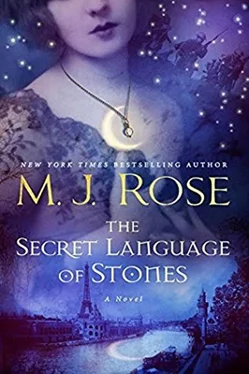When I visited, I made a habit of hiding from the forced gaiety as soldiers overindulged in food, wine, and sex in order to forget. My great-grandmother provided a great service, but for me, being at Maison de la Lune, as her house is called, was like attending theater and suffering through a desperate, debauched, and sometimes depressing play.
As Grigori and I descended the staircase leading to my room, both of us were all too aware of the uneven cadence of his steps as he struggled with his damaged leg. I hated the sound for his sake.
At my door, I invited him in, as was our ritual. Whenever he dined with Anna and Monsieur, or whenever he surfaced from his melancholy and asked me to the theater or dinner, an art show or opera, at the end of the evening I would always invite him in and he would always accept my invitation.
He made himself comfortable on the couch while I poured us both brandies and sat down next to him. Usually we talked for a while, but that night he seemed unable to wait and reached out-almost as if it was causing him pain-and pulled me to him.
His hands and his lips were, as usual, insistent, hungry. As if he were capable of devouring me. He slid his hand up my skirt. The feel of his fingers on my stocking leg sent shivers farther up. He moved from calf to knee to thigh. I heard my breath catch. Grigori’s lips moved against mine, and I returned his kiss. His hand moved farther, finding my cleft, tickling me, making me buck. He unbuttoned my blouse, exposing my skin to the cool air. The oblivion his passion promised excited me. I thrust my breasts up toward him, and he pulled down my brassiere to kiss my nipples, holding first one then the other between his teeth. I ran my fingers through his soft hair. He moaned, and I felt him, hard against my thigh, ready for more, ready for me.
But we didn’t reach a pleasured place because that night, as Grigori always did, he suddenly stopped, turned from me, and stood, leaving me on the couch, gasping and waiting, ready.
I felt sympathy, despite my frustration. As long as he eschewed that ultimate intimacy, as long as he continued to be ashamed to be with a woman because of his mangled body, we would never move past the awkward stage of undressing. But I didn’t know what to do or what to say. I wasn’t an experienced enough lover to know how to coax a man into relaxing. I’d lost my virginity to Timur, but we’d only been together a few times. I remained naïve in bed. One of my great-grandmother’s courtesans would have been of more use to him.
I longed for the connection women whispered about, the desire to be one with your lover, the willingness to give up your body, especially in a time of war, when romance had been swept away and replaced with fear, when most eligible men my age were off fighting. But my shyness and his embarrassment kept us apart.
“I’m sorry,” I said.
He spun around, his brown-diamond eyes flashing. “For what? I stopped because I cannot take advantage of you. Not in my father’s house, not under his roof. And not when I have a meeting to attend.” He pulled out an elaborate ruby-studded gold pocket watch. “And not when my meeting starts in fifteen minutes.”
Grigori left my suite abruptly to collect his father and Vanya for the meeting. For a few moments, I contemplated getting into bed with a book. Far too restless, I straightened out my clothes and returned to the shop.
I sat at my workbench, prepared my tools, and listened to Monsieur, his son, and his friend Vanya descend the steps leading deep beneath the store’s basement.
Under the marvelous Palais courtyard and fountains and gardens lay a mysterious world where no light penetrated and the only sounds were made by rats, falling rocks, or men stealing through secret spaces.
At least that was all most people heard. Other sounds, terrible sounds, haunted me.
All of Paris sits atop limestone and gypsum mines, known as the carrières , some of which date back as far as the thirteenth century, when the stones that built the city were first excavated. No longer worked, the mines run for miles, a long network of empty tunnels and caves. Some were appropriated for the metro, others as havens for criminal, religious, and occult groups. During the war, the underground had turned into a secret highway for spies as they maneuvered around the city undetected.
Soldiers policed the caves, trying to protect us from enemies who might attack us from underneath, but the labyrinth was too complex for them to safeguard all of it at any one time.
Ironically, while spies hid in some caverns, Parisians used others as shelters during bombings. There were several beneath the Palais. The small one we used could hold approximately twenty people comfortably. Monsieur Orloff also held his Two-Headed Eagles meetings there.
Close by the shelter, through a door and down an incline, was another cavern that Monsieur had transformed into a vault for his materials and assets. Access to both was gained through the store. Continuing on past the shelter and the vault, one came to a locked door. Through it, a series of secret tunnels eventually led to the other side of the river.
There are no signs, no landmarks aboveground, to advertise the entrances to Paris’s subterranean world. I’d heard stories of people who wandered for days, never finding a way out, who were buried alive in an avalanche, or who died taking a wrong turn and falling down a shaft.
It’s easy to get lost. Once, after an air raid, I decided to explore, thinking maybe I could discover the source of my unease about going underground. I unlocked the door and ventured into the mine.
Missing a turn, I spent over an hour trying to retrace my steps, my panic building. Suddenly I heard a loud and terrible noise. I took another step and looked into a cavern converted to a tomb. The deafening sound seemed like a nightmare come to life. The catacombs were clearly the source of my torture.
Starting in 1777, in reaction to health problems caused by overcrowding in aboveground cemeteries, the city started to exhume bodies and rebury the dead in some of the empty caves. Over six million were buried in the ossuaries, and I’d stumbled upon one of the chambers.
Standing on the threshold, I stared at the skeletal remains, bones arranged in a macabre design, the source of the thunderous noise, the cacophony of terror and tears. Here resided the last thoughts of so many who had died in pain. Their suffering trapped in their bones.
Similarly to how I was able to hear the dying thoughts of the soldiers via the crystals in the talismans, I heard these poor souls’ final moments through the stone-studded earth. En masse, magnified, the storm of cries, curses, and calls terrified me.
And yet, when the sirens rang out or Monsieur sent me down to the vault, my only choice was to steel myself and endure. The same way I endured the voices of the individual soldiers whose loved ones came to me, like my most recent visitor, Madame Alouette.
I placed the box holding the envelope with her son’s lock of hair on my worktable, but I didn’t open it. Not yet. First I needed to prepare the object that would hopefully allow me to help her find peace.
Sorting through two dozen chunks of rock crystal, I chose an egg-shaped orb about the size of my thumb. Once a month I brought the lapidary a dozen or so crystals, which he cut into eighths, like segments of an orange, and then polished. I did all the engraving myself. And although the work was painstaking, it absorbed me. While I sat at my table, all thoughts disappeared. I connected with my tools, and they became extensions of my hands.
Sometimes, while scratching out the words and numbers and runes, I would crack a crystal, but the night of the tsar’s news, the operation went smoothly.
Читать дальше












